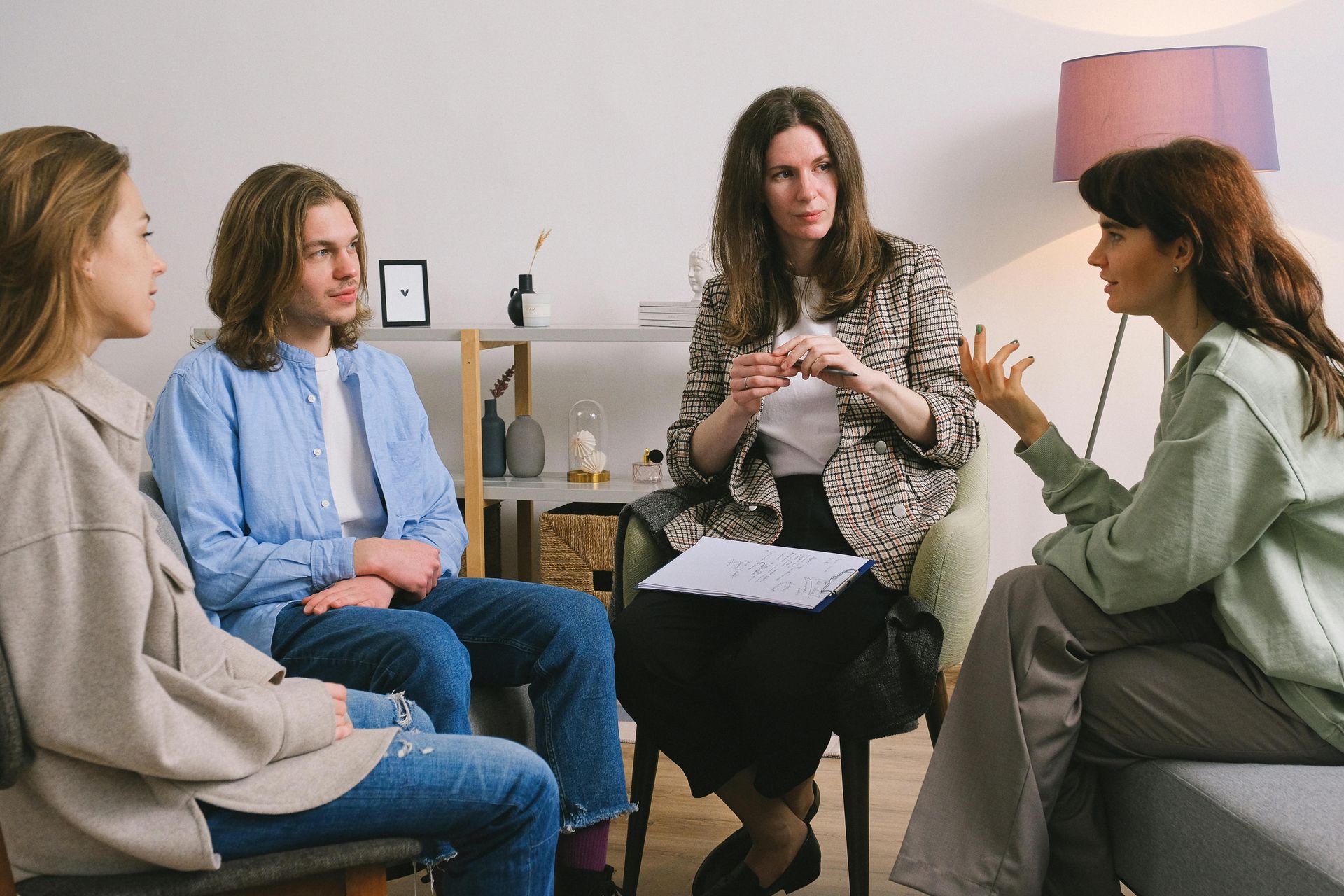Group Psychotherapy

Group Psychotherapy is a special form of therapy in which a small number of people meet together under the guidance of professionally trained therapist to help themselves and one another. The therapy has been widely used and has been a standard treatment option for over 50 years.
If you stop and think about it, each of us has been raised in group environments, either through our families, schools, organized activities or work. These are the environments in which we grow and develop as human beings. Group psychotherapy is no different. If provides a place where you come together with others to share problems or concerns, to better understand your own situation, and to learn from and with each other.
Group therapy helps people learn about themselves and improve their interpersonal relationships. It addresses feelings of isolation, depression or anxi-ety. And, it helps people make significant changes so they feel better about the quality of their lives. Additionally, group therapists can apply the principles of group to other settings and situations such as businesses, schools and community organizations.
Group works! In studies comparing group psychotherapy to individual ther-apy, group therapy has been shown to be as effective and sometimes even more effective.
How Do You Know If You Can Benefit?
Like individual therapy, group therapy can benefit almost anyone. Some of the issues typically addressed include:
• Difficulties with interpersonal relationships
• Depression and anxiety
• Addictive disorders
• Loss
• Trauma
• Medical illness
• Personality disorder
• Lifestyle issues within a traditional culture
• Problems facing children and adolescents such as impact from a divorce, peer issues, family dynamics, learning or behavioral problems)
Ten Reasons To Do Group Therapy
- Discovering and accepting previously unknown or unacceptable parts of myself.
- Being able to say what was bothering me instead of holding it in.
- Other members honestly telling me what they think of me.
- Learning how to express my feelings.
- The group's teaching me about the type of impression I make on others.
- Expressing negative and/or positive feelings toward another member.
- Learning that I must take ultimate responsibility for the way I live my life no matter how much guidance and support I get from others.
- Learning how I come across to others
- Seeing that others could reveal embarrassing things and take other risks and benefit from it helped me to do the same.
- Feeling more trustful of groups and of other people
The Group Therapy Session
The group therapy session is a collaborative effort in which the therapist assumes clinical responsibility for the group and is members. In a typical session, which lasts about 75-90 minutes, members work to express their own problems, feelings, ideas and reactions as freely and honestly as possible. Such exploration gives the group the important information needed to understand and help one another. Members learn not only to understand themselves and their own issues but also become "therapeutic helpers" for other members.
How does group work?
A group therapist appropriately selects people (usually 5 to 10) who would be helped by the group experience and who con be learning partners for one another. In meet-ings, people are encouraged to talk with each other in a spontaneous and honest fashion. A professionally trained therapist, who provides productive examination of the issues or concerns affecting the individuals and the group, guides the discussion.
Not every group is alike. There are a variety of styles that different groups use. For instance, some focus more on interpersonal development, where much of the learning actually comes from the interaction between members, Others address thoughts and behaviors, where the emphasis is on learning how to control negative thoughts address phobias or relleve anxiety-inducing situations.
What are the different type of groups?
Group therapy focuses on interpersonal relationships and helps individuals learn how to get along better with other people under the guidance of a professional.
Group psychotherapy also provides a support network for specific problems or challenges. The psychotherapy group is different from support and self-help groups in that it not only helps people cope with their problems, but also provides for change and growth. Support groups, which are generally led by professionals, help people come with difficult situations at various time but are usually geared toward alleviating symptoms. Self-help groups usually focus on a particular shared symptom or situation and are usually not led by a trained therapist.
Why is group therapy useful?
When someone is thinking about joining a group, it is normal to have questions or concerns. What am I going to get out of this? Will there be enough time to deal with my own problems in a group setting? What if I don't like the people in my group?
Joining a group is useful because it provides opportunities to learn with and from other people, to understand one's own patterns of thought and behavior and those of others, and to perceive how group members react to one another. We live and interact with people every day and often there are things that other people are experiencing or grappling with that can be beneficial to share with others. In group therapy, you learn that perhaps you're not as different as you think or that you're not alone. You'll meet and interact with people, and the whole group learns to work on shared prob-lems-one of the most beneficial aspects. The more you involve yourself in the group, the more you get out of it.
What kinds of people should participate in group therapy?
Group therapy can benefit many different people, from those having difficulties with interpersonal relationships to those dealing with specific problems such as depression, anxiety, serious medical illness, loss, addictive disorders or behavioral problems. With adoles-cents, for example, group therapy teaches socialization skills needed to help function in environments outside the home.
Will there be people with similar problems in my group?
The therapist's role is to evaluate each member's problems prior to forming the group. Usually there is a mix of members who can learn from each other. While some members will have similar circumstances, it's not necessary for all to be dealing with exactly the same problem.
In fact, people with different strengths and
difficulties are often in the best position to help one another.
What kind of time commitment do i need to make?
The time commitment depends on the type of group and the nature and extent of your problems. Short-term groups devoted to concrete issues can last anywhere from 6 to 20 weeks. Support therapy groups (for ex-ample, those dealing with a medical illness such as can-cer) may be more long-term. There are also more open-ended groups in which members work at their own pace and leave when their particular needs or goals have been met.
It's best to talk with you therapist to determine the length of time that's right for you.
What if I'm uncomfortable discussing my problems in front of others?
It's not unusual to feel uneasy or embarrassed when first joining a group, but soon you begin to develop feelings of interest and trust. Most clients find that group therapy provides a great deal of relief because it allows them a chance to talk with others who are experiencing similar problems-in a private, confidential setting. Many people who have experience group therapy believe that working together with others is helpful and they feel better by participating in this form of therapy.
What does group cost?
The cost varies depending on the type of therapist and perhaps even the geographic area of the country.
Is group covered by insurance?
It depends on the type of group and your particular Insurance company whether or not there is insurance coverage. Often times insurance coverage is similar for both group and individual therapy.
